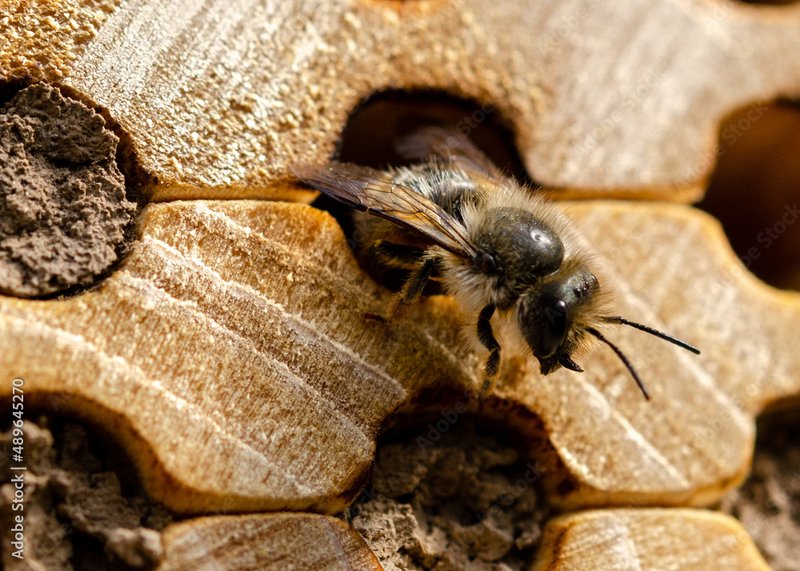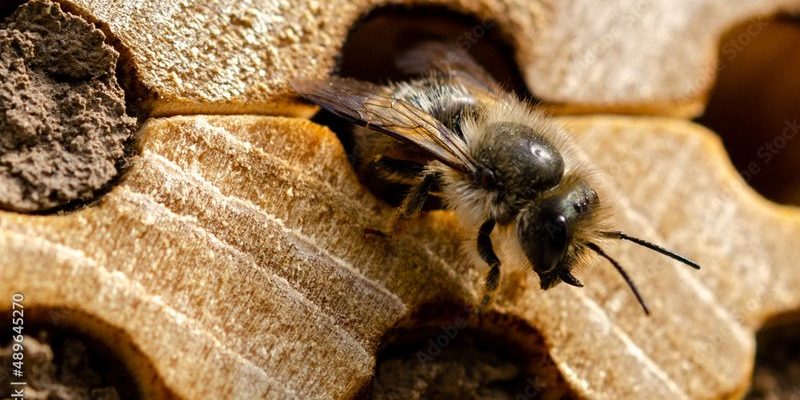
Mason bees are tiny, solitary pollinators known for their mud-making skills. They don’t live in hives like honeybees; instead, they nest in small cavities. Imagine a little architect building mud structures for its young—pretty cool, right? But while mason bees are important for the environment and not typically aggressive, it’s essential to understand their behavior, especially regarding stinging. So, grab your favorite drink, and let’s explore whether these remarkable creatures pose any threat to us.
Understanding Mason Bees: What Are They?
Mason bees belong to the genus *Osmia*, encompassing over 140 species. They’re about the size of a grain of rice, with a fuzzy body that helps them collect pollen. Unlike honeybees, which are social and live in large colonies, mason bees are solitary. This means they build individual nests and take care of their young without assistance from a swarm.
You might find mason bees in gardens, parks, and orchards, where they’re busy pollinating flowers. Their role in agriculture is pretty significant—some studies suggest that mason bees can be more effective pollinators than honeybees for certain crops. This makes them invaluable allies in our quest for healthy plants and bountiful harvests.
But you’re probably more interested in their interaction with humans. So, let’s discuss whether they’re likely to sting or be aggressive.
Do Mason Bees Sting?
The short answer is: not really. Mason bees can sting, but it’s pretty uncommon. They’re more likely to fly away than attack you. If you think about it, it makes sense—like most bees, mason bees have a natural instinct to protect their nests. However, since they don’t live in large colonies, their need to defend themselves is minimal.
Let’s break this down a bit. Mason bees are generally non-aggressive. They do have stingers, but their primary focus is on foraging for food and caring for their young rather than confronting potential threats. You might be wondering what would make them sting. It typically occurs when they feel cornered or directly handled. So, if you see them buzzing nearby, just give them some space, and they’ll likely continue about their business.
Mason Bee Behavior and Aggression
Mason bees are pretty chill compared to other bee species. Their nature is much more about food gathering and nest building than confrontation. If you’ve ever seen one flitting from flower to flower, you’d notice they seem absorbed in their task—almost like they’re on a mission.
Here’s the thing: mason bees don’t have a hive mentality like honeybees do. Because they’re solitary creatures, they don’t need to protect a large colony. This lack of hive defense translates to a lower chance of aggressive behavior. If you leave them alone, they’ll leave you alone.
However, if you’re ever close to a nest, things can be different. Mason bees lay their eggs in small holes and use mud to seal them. If you accidentally disturb their nesting site, they might become defensive. So, it’s best to admire these little builders from a distance.
Mason Bee Safety: How to Handle Encounters
Even though mason bees aren’t usually dangerous, knowing how to interact with them safely can enhance your experience. If you plan to garden or spend time outdoors, here are some tips for a positive encounter:
- Observe from afar: Enjoy watching mason bees without getting too close. They’re hard at work, so let them do their thing.
- Garden thoughtfully: If you’re planting bee-friendly flowers, do so knowing that mason bees love variety. This can increase your chances of seeing them up close.
- Be gentle: If you need to handle a plant or flower where a mason bee is foraging, try to move slowly and carefully, so you don’t startle them.
If you ever find yourself in a situation where a mason bee seems unusually defensive, remember to stay calm. You might want to slowly back away to give it space.
Are Mason Bees Beneficial for Gardens?
Absolutely! Mason bees are fantastic for your garden, and welcoming them can make a significant difference in your plants’ health. They have a remarkable ability to pollinate flowers effectively, which can lead to larger and more abundant crops.
Their pollination skills are especially beneficial for fruits and vegetables. For example, if you’re growing apples, cherries, or raspberries, mason bees can help maximize your yield. They visit flowers in quick succession, transferring pollen from one blossom to another, making them highly efficient.
If you’re interested in attracting these helpful pollinators, consider creating a mason bee house in your garden. It’s simple and involves providing small tubes or holes where they can nest. This gives mason bees a safe space to lay eggs and thrive.
In summary, mason bees are not dangerous and are actually a boon to our gardens and ecosystems. While they can sting, they rarely do—especially if we respect their space and behavior. These little pollinators are busy working for a greener world, and appreciating them can not only enhance your gardening efforts but also increase your connection to nature.
Next time you see a mason bee buzzing nearby, remember how important they are and how harmless they can be. So, let’s celebrate these quiet helpers, ensuring they have a safe space to thrive, all while enjoying the beauty they bring to our environment. Happy gardening!

